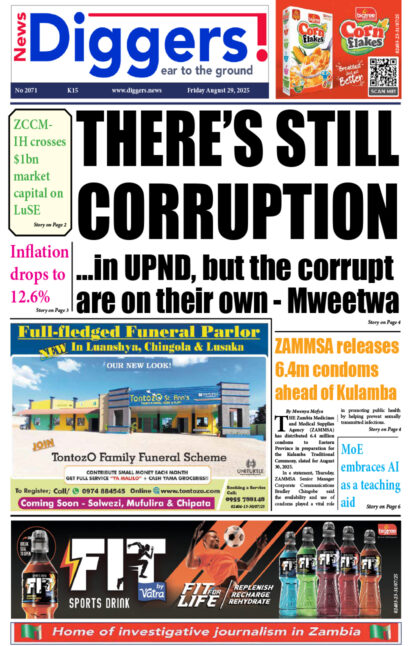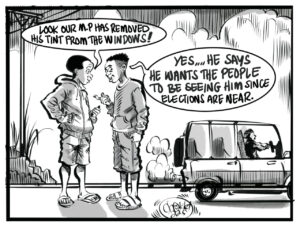Vice-President Inonge Wina says the proposed Political Parties Bill will go a long way in curbing corrupt financing and use of illicit funds in political party campaigns.
Opening a Ministry of Justice stakeholders’ consultative forum in Lusaka today, Vice-President Wina noted that the bill would not only strengthen the country’s democracy but that it would provide citizens with a platform for political participation.
“This will go a long way in curbing corrupt financing in politics and the use of illicit funds in political campaigns. Therefore, this is an opportunity for stakeholders to ensure that a law is put in place to ensure that resources and types of funding for political parties and their campaigns is of acceptable levels and sources. To you colleagues from civil society and faith based organisations, this is your opportunity to help guide the way political parties should operate in growing our democracy and therefore, your contribution to this process will indeed enhance transparency and accountability in the operations of political parties,” Vice-President Wina said.
“The Political Parties Bill that we will be considering for the next five days is a working document that has been prepared to provide a platform on which stakeholders can be engaged. This bill has been drafted in line with article 60 (4) of the Constitution, in order to develop an effective regulatory framework to guide the operations of political parties. It is important to reflect on why we are here today. You are all aware that the last Constitutional reforms were a lengthy process, and some of the articles of the Constitution such as Article 60 (4), that we are putting in subsidiary legislation, were proposed before the Patriotic Front formed government in 2011. I wish to remind you that these provisions in the draft bill that we are tabling today we included in the people driven Constitution, to express the people’s desires and vision for advancing our democracy.”
She expressed confidence that the bill would strengthen the country’s democracy once enacted.
“The strengthening of democracy does not only require a good electoral system, a functional national assembly, judiciary or other institutions and processes, it also requires a strong culture of democracy with robust, transparent, internally democratic and accountable political parties. Political parties are a key feature of democracy and good governance that provide citizens with a platform for political participation and also serves as a training ground for future political leaders. Political parties further lay an important role in shaping the relationship between the executive and the legislature and in prioritising the legislative agenda. It is common knowledge that a well-functioning democracy depends on well-functioning political parties,” Vice-President Wina said.
“Good governance also demands that we promote democracy and equitable participation by both men and women especially in decision making positions and promote the rule of law by putting in place legal frameworks that should be fair and enforced partially. Political parties have a role to promote democracy, constitutionalism, transparency and consensus building before decision making. Therefore, if this is to be achieved, we need to put in place legislation that will ensure that political parties adhere to these principles even at party level.”
And Vice-President Wina encouraged stakeholders not to view the bill as something being done in bad faith.
“The provision of legislation that guide the operations of political parties should not be viewed as a law being done in bad faith but must be instead viewed as an opportunity for the country to move forward in enhancing the legal framework of our democratic agenda. This type of regulation is not only unique to Zambia , there are developed countries that have such regulations in place, including African countries like Kenya, Sierra Leone and South Africa,” said Vice-President Wina.
Meanwhile, justice minister Given Lubinda said the political parties bill would promote constructive criticism in provision of checks and balances.
“The consultative process on the political parties bill which I flagged off on 18th August was opened up to all stakeholders who were asked to make submissions to the Ministry of Justice. I am delighted to inform you that during this period, we have received a lot of written submissions from political parties, civil society, the youth and many others. It is good that political parties whom this bill will mainly apply to have taken a keen interest in the bill and are also here together, we come up with comprehensive submissions that will inform the drafting of the of the bill. I would like to inform our partners that their support through the United Nations Development Programme (UNDP) basket fund project has been timely and has played a fundamental role in ensuring that consultations with key stakeholders on this bill, are widely undertaken,” said Lubinda.
“We are duty-bound to enhance consultations on the political parties bill because the law we are developing will guide the registration of political parties and provide a legal framework that will among other things promote morality, patriotism, transparency and accountability in the way political parties operate and provide for public inspection of political parties accounts and financing. This will promote constructive criticism and checks and balances in the political system so that political parties begin to function with a national purpose, represent the interests of the people and safeguard the resources of the nation, for sustainable development.”
























